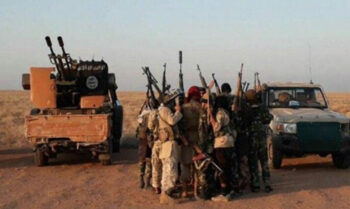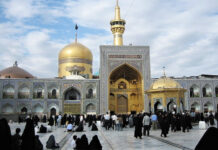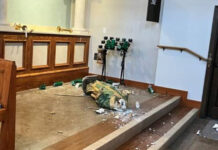Although the Counter-ISIS International Coalition command and the leaders of Syria Democratic Forces announced the elimination of the so-

called Caliphate of the “Islamic State” in March 2019, recent developments on the ground indicate that ISIS has not been fully eliminated. ISIS continues launching military operations and counter-attacks which are met with security campaigns by Coalition forces and their Syria Democratic Forces partner throughout SDF-controlled areas, in addition to military operations by Russian and regime forces against ISIS cells in areas under their control. However, ISIS cells are still able to exploit opportunities to create a security vacuum and carry out assassinations, which clearly indicates that the “Islamic State” is still alive and kicking.
In the 114th month after the declaration of “Al-Baghdadi’s Caliphate,” ISIS carried out 17 operations, including armed attacks and explosions, in areas controlled by SDF. Those operations left eight fatalities: a civilian, six members of military formations operating in SDF-controlled areas and one ISIS member.
Those operations are distributed regionally as follows:
- Deir Ezzor: 12 operations left two combatant and a civilian dead.
- Al-Hasakah: Two operations left two combatants dead.
- Al-Raqqah: Two operations left a two combatants dead.
- Aleppo: One operation left an ISIS member dead.
On the other hand, the owners of currency exchange offices and traders in Theban and Al-Hawa’aj towns in eastern Deir Ezzor countryside have been threatened by ISIS members. This coincided with increasing ISIS attacks on positions within SDF-held area since early 2024.
These threats are made by communicating on the persons’ numbers using international numbers via “WhatsApp” in order to collect money for ISIS under the name of “taxation” (Jeibayah), while the persons who will refuse to pay the “taxes” will be punished, according to these threats.
Meanwhile, Syrian Observatory for Human Rights (SOHR) activists documented the participation of the International Coalition in five joint security operations with SDF, namely raids and airdrops, arresting seven ISIS members and commanders and killing one commander.
On January 8, an Iraqi ISIS commander was killed in an airdrop carried out by International Coalition Forces in the early hours of Monday morning on the commander’s house in Al-Jarthi town in the eastern countryside of Deir Ezzor. This coincided with flights by helicopters over the region.
In the Syrian desert, however, ISIS escalated its operations, including ambushes, armed attacks and explosions, in areas under the control of the Syrian regime and its allies, especially in Al-Rasafah desert, the surrounding areas of Jabal Al-Bishri in Al-Raqqah, the frontlines of Ithriyah, Al-Rahjan and other frontlines in the eastern countryside of Hama, the desert of Al-Sukhnah, Palmyra in Homs countryside, Deir Ezzor desert and the administrative border between Al-Raqqah and Deir Ezzor.
According to SOHR sources, ISIS carried out 26 attacks in the past month, killing 60 regime soldiers and Iranian-backed militiamen, while ISIS lost nine members in security operations in the desert. In addition, eight civilians, including a child, were killed in the same period in ISIS attacks in the Syrian desert.
Here is a regional distribution of those attacks:
- Deir Ezzor desert: Ten operations left 25 fatalities: 23 combatants, including seven Iranian-backed militiamen, and two ISIS members.
- Homs desert: 11 operations left 29 fatalities: 24 combatants, including one Iranian-backed militiaman, four ISIS members and one civilian.
- Al-Raqqah desert: Two operations left 12 fatalities: nine combatants and three ISIS members.
- Hama desert: Two operations left eight fatality: one combatant and seven civilians, including a child.
- Aleppo: One operation left three Iranian-backed militiamen dead.
Moreover, ISIS executed a massacre on January 21 when it killed six civilians in Wadi Al-Azeeb area in Hama desert.
Separately, ISIS lost ten members in acts of violence in Daraa province.
Islamic State’s abductees: ignored and unaccounted
Although nearly 58 months have passed since the International Coalition’s announcement of the defeat of ISIS which was a dominant force east of Euphrates River, and with the recent developments over the past period, however, silence still surrounds the issue of ISIS’s abductees. All sides remain quiet and provide no clarification on the fate of thousands of abductees, where fear continues to grow for the lives and fate of the abductees, including Father Paolo Daololio, Bishops John Ibrahim and Paul Yazji, Abdullah Al Khalil, a British journalist, sky News journalist and other journalists, in addition to hundreds of abductees from Ain Al Arab (Kobani) area and Afrin, as well as the people of Deir Ezzor.
With the continuing crimes and violations against Syrian civilians, including death threats against SOHR workers by the Islamic State and other killers and criminals in Syria, The Syrian Observatory for Human Rights renews its vows to continue its work by monitoring, documenting and publishing all violations and crimes that committed against the Syrian people.
We, at the Syrian Observatory for Human Rights, renew our call to the UN Security Council to refer those war crimes and crimes against humanity committed in Syria to the International Criminal Court so that all the criminals and killers of the Syrian people are brought to justice.
SOHR has been all along warning against ISIS resurgence and stressing that the defeat of ISIS in Syrian territory, as declared in 2019, was “symbolic”, as ISIS has been only eliminated as a controlling power in populated areas. The daily attacks by ISIS fighters and cells throughout Syria, clearly indicate that the “Islamic State” is still alive and kicking. While the frequent security campaigns and military operations by regime forces, Russia, International Coalition, and SDF have all failed so far to curb or hinder ISIS’s escalating activities.
The Syrian Observatory also points out that it had already warned, well before “Islamic State of Iraq and the Levant” declared itself as a “Caliphate State” in Syria and Iraq, that this organization did intend to work for the Syrian people and serve their interest, but rather ISIS continued to kill innocent Syrians, who had been suffering the brutality of war and violence and became displaced.
Furthermore, the “Islamic State” recruited children in the so-called “cubs of the caliphate”, controlled the wealth and resources of the Syrian people and harnessed them to build a “caliphate”, and traded openly back and forth with one of Syria’s neighbouring countries. — Syrian Observatory for Human Rights






